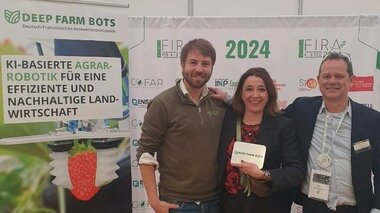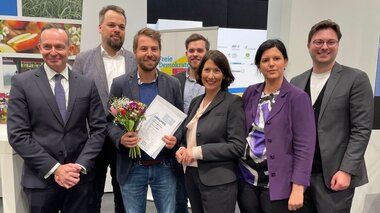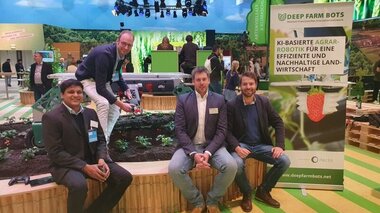FIRA - World Ag Robotics Forum
Last week we had the chance to meet the FIRA - World Ag Robotics Forum in Toulouse.
Read more

The recently approved ZIM cooperation network "DeepFarmBots" met virtually on November 25 for the official kick-off. The central goal of the network is the development and dissemination of new agrobotic solutions for efficient and sustainable agriculture. In an interdisciplinary approach, agricultural robotics will be linked with new methods of Deep Learning and synergy effects between the partners will be deepened. The network is funded by the Central Innovation Program for SMEs of the German Federal Ministry for Economic Affairs and Energy.
The ZIM cooperation network DeepFarmBots brings together players from the fields of agricultural robotics, hardware and drives, sensor technology, IoT, AI, agroecology and agriculture. This results in the unique opportunity to comprehensively follow the development of agricultural robotics solutions across applications. An important role is played by the exchange with farmers involved in the network, in order to incorporate real needs and requirements from practice into the technical development.
Members of the network are: Zauberzeug GmbH (robotics, software and AI), OndoSense GmbH (radar sensor technology), WELLGO Systems GmbH (drive technology), Spacenus GmbH (remote sensing and AI), Othmerding Maschinenbau GmbH & Co.KG (agricultural machinery technology), Toposens GmbH (ultrasound sensor technology), farming revolution GmbH (agricultural robotics and AI), LUPA-Electronics GmbH (IoT), W. Neudorff GmbH KG (environmentally friendly plant care products), Deutsches Forschungszentrum für Künstliche Intelligenz GmbH (DFKI), Leibniz-Zentrum für Agrarlandschaftsforschung (ZALF) e. V. and Westfälische Wilhelms-Universität Münster (with the working group "Computer Vision and Machine Learning Systems", and the Institute for Geoinformatics). The network management is provided by ifectis Innovationsförderung.
The network management points out that the network is open for further partners. Interested companies and research institutions that would like to participate in R&D projects and can contribute complementary expertise are just as welcome as potential users of the newly developed solutions.

Last week we had the chance to meet the FIRA - World Ag Robotics Forum in Toulouse.
Read more

Our networkmanager Sven Lake has been awarded by German AgriFood Society with the PIONEER AWARD 2024 in the category of intelligence, because of his long-term engagement in agriculture suitable for grandchildren through innovative technologies.
Read more

DeepFarmBots visited the International Green Week in Berlin.
Read more